
Appointing chief justices of the United States and associate justices to the US Supreme Court is one of the president's important powers, but there's no way to know how much any given president will exercise that power until his term is over. The vagaries of death, illness and retirement mean that some long-serving presidents appoint only a few, while other short-timers appoint more.
George Washington, of course, appointed the most, since there was no Supreme Court when he took office. He appointed 10, or 11 if you count John Rutledge, a 1795 recess appointment to chief justice that the Senate refused to confirm. FDR would seem a natural for the second highest number of appointees, and indeed that's the case. He got nine, a full court's worth; no packing necessary in the long run.
The third-highest number of appointees is a surprise -- but also appropriate. The judicial-minded William Howard Taft, president only four years, nevertheless named six justices to the high court, including Chief Justice Edward White, whom Taft succeeded in the job in 1921.
Only four presidents missed the opportunity to appoint justices. William Henry Harrison barely had time to unpack his bags, much less make judicial appointments. Likewise, Zachary Taylor died before he could name any Supreme Court justices -- though Millard Fillmore, who didn't have much more time in office, got to appoint one, Associate Justice Benjamin Curtis. The remarkably luckless Andrew Johnson didn't have the opportunity either, though he served nearly an entire four-year term. He was so much at odds with the Senate that his appointments probably would have been problematic anyway. Finally, Jimmy Carter didn't appoint any justices, which was probably as much a function of good health and longevity among sitting justices in the late 20th century as anything else.
On January 16, 1888, Mississippian Lucius Quintus Cincinnatus Lamar (pictured) was confirmed by the Senate as an associate justice. It was the cap of a remarkable career that saw Lamar in the antebellum US Congress, serve the Confederacy both in military and civilian capacities, and then return to the US Congress after the war. Lamar was the first of four justices appointed by President Cleveland, and he was recalled many years later in Profiles in Courage as a courageous Senator, especially for his eloquent eulogy of one-time Radical Republican and bitter enemy Charles Sumner in 1874. Short bio here.
No comments:
Post a Comment